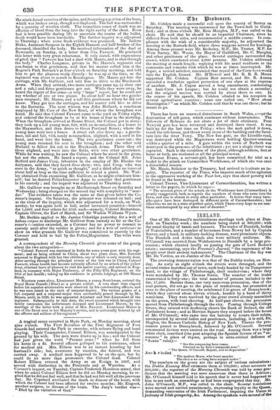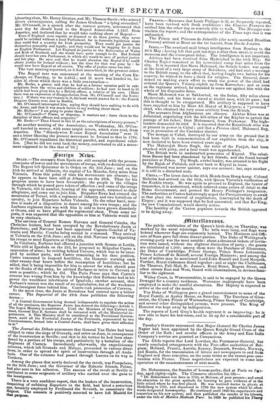IRELAND.
One of Mr. O'Connell's multitudinous meetings took place at Dundalk on Thursday week ; the numbers being stated at 300,000; with the usual display of bands and banners. The trades of Dundalk, bodies of Teatotallers, and a number of horsemen from Newry led by Captain Seaver, and a band, in military-looking dresses, were:prominent objects. The Dundalk and Ardee bands also wore military uniforms. Mr. O'Connell was escorted from Walshestown to Dundalk by a large procession ; which cheered loudly on ,passing the gate of Lord Roden's estate ; announcing, says the Freeman's Journal," the supremacy of the people over their ancient taskmasters." The Chairman of the day was Mr. De Verdon, an ex-Justice of the Peace.
The crowning demonstration was that of the Dublin trades, on Monday. As early as eight o'clock the streets were thronged, and the several trades marched out of town, each body headed by its Temperance band, to the village of Phibsborough, their rendezvous; where they were marshaled by Mr. Thomas Steele. The number of the trades enumerated is forty-one ; the total number of persons included in the list, 17,280. Besides those, one very numerous procession, that of the coal-porters, did not go to the place of rendezvous, but proceeded at once to the place of meeting, the celebrated far-green of Donnybrook ; which they entered about eleven o'clock, headed by a band of thirty musicians. They were received by the great crowd already assembled on the green, with loud cheering. At half-past eleven, the procession moved from Phibsborough through the city. Passing through College Green, they saluted with deafening cheers the Bank of Ireland, the old Parliament-house ; and at Merrion Square they stopped before the house of Mr. OConnell:; who came into the balcony to return their salute, accompanied by several ladies and gentlemen, including, it is said, Dr, Hughes, the Roman Catholic Bishop of New York. Thence the procession passed to Donnybrook, followed by Mr. O'Connell. Several ornamental devices were erected on the road. Among them was a large white cloth, inscribed (the poet adopting the Spanish licence of an "assonance" in place of rhyme, perhaps in ultra-critical defiance of "Saxon " rules)— " See the conquering hero cones. Cheered on by Ernt's temperate sons." Ano h r The Queen, O'Connell, Repeal, arid no Separation."
"The modern Moses, who burst asunder The chaise we so long have stooped uuder."
The numbers on the green are the subject of various calculations: the Dublin Evening Mail estimates them at 100,000; other accounts at 200,000; the reporter of the Morning Chronicle was told by some gentlemen that the meeting was more numerous than those at Athlone; Mr. O'Connell himself said in his speech that it never had happened to him to see such an assemblage as had been congregated that day. Mr. JohnO'Connell, M.P., was called to the chair. Several resolutions were moved and carried unanimously, expressing loyalty to the Queen, demanding restoration of the Irish Parliament, imputing the Union to jealousy of Irish prosperity, &c. Among the speakers were several of the labouring class, Mr. Henry Grattan, and Mr. Thomas Steele ; who uttered divers extravagances, calling Sir James Graham " a lying scoundrel." Mr. O'Connell, in a speech after the current pattern, announced that next day he should hand to the Repeal Association 1,125/. from America, and declared that he would take nothing short of Repeal— Even if England were capable or disposed to do them justice, they never could be satisfied without a local Parliament, for in domestic legislation alone they could find a security for Irish prosperity. They could get justice for themselves peaceably and legally, and they would not be begging for it from an English Parliament. Let England do justice to the Rebeccaites of Wales and Kirk of Scotland, and she would have quite enough to do. But Ireland should have her own Parliament, in which she would be sure of perfect justice and fair play. Be once said that he would abandon the Repeal if he could obtain justice for Ireland without ; but the time for that was gone by : he would now have Repeal at all events. The offer of justice came too late.
The vast meeting separated, as it had assembled, in the greatest order.
The Repeal rent was announced at the meeting of the Corn Exchange, on Tuesday, to be 2,4951.; and 5/. more was handed in, besides IL about which there was a little conversation— Mr. Burke, a grocer, said that he had on a former occasion paid in subscriptions from the wives and children of soldiers: he had now to hand in 1/. which had been given him by a British officer, a relative of his own. (Here there was an expression of disapprobation from Mr. O'Connell and the Secretary.) If there was any treason in it, his head would answer for it : the Fourth Dragoon Guards were now in Dublin. Mr. O'Connell interrupted him, saying they should have nothing to do with the Army, and that it was much better to say nothing about them.
Mr. Burke—" I am going to praise them."
Mr. O'Connell—" Praise, or dispraise, it matters not : leave them to the discipline of their officers and sergeants." Mr. Burke—" Then I hand in this IL as the subscriptions of twenty persons."
At another meeting of the Association, on Wednesday, Mr. O'Connell handed in money, with some turgid letters, which were read, from America. The "Brandywine Emmet Repeal Association" sent 71. and a letter likening the present movement in Ireland to that in 1798. Mr. O'Connell repudiated the historical parallel, and reprobated rebellion. [But he did not send back the money, contributed to aid a movement supposed to be like that of '98.]



























 Previous page
Previous page